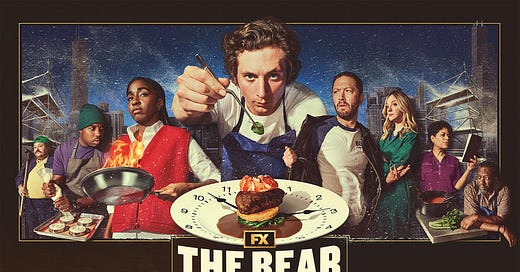The Most Pro-Capitalist Show on Television
"The Bear" is one of the best shows on television. It's also the most pro-market show.
[WARNING: This post contains spoilers for the first two seasons of The Bear.]
So I have a few articles coming out this week in other venues. My favorite one is about one of my favorite television shows, The Bear, which airs on FX and Hulu. It is nominally a comedy but really runs the gamut from laugh-out-loud funny to agonizingly tense.
There are a lot of the reasons The Bear has been so well-received. The directing is fantastic – the majority of a season-one episode consists of a single 18-minute shot in cramped and crowded kitchen. The acting is uniformly excellent; in the second season the number of star cameos (including but not limited to Jamie Lee Curtis, Olivia Colman, John Mulaney, and Bob Odenkirk) reached absurd heights. The Chicago setting is on point. As a former resident I was thrilled to see so many good restaurants make cameos, especially avec. The soundtrack contains some absolute bangers; whenever the stress reaches a fever pitch, the opening to Refused’s “New Noise” starts playing and it is perfection.
But there’s another reason that I think The Bear is interesting — it’s the opposite of the “Eat the Rich” narrative that infuses, say, The Menu. Writing for The Yale Review,1 I argue that The Bear’s pro-capitalism message makes it one of the more unique programs on television:
One of the things that makes it truly distinctive is how convincingly it cuts against the grain when it comes to engaging with the marketplace. It does not just buck the “eat the rich” genre exemplified by The Menu—it consciously offers a more positive path for surviving and thriving in a capitalist world. The Bear argues that striving to excel in work can also help you find a sense of meaning in life.
At the start of the second season, Richie asks Carmy, “You ever think about purpose?” This question of purpose recurs throughout the season. In the “Forks” episode, Garrett challenges Richie, saying, “Let me give you some purpose.” By the end of the second season, Richie and the entire show’s supporting cast are in a better place than they were in the pilot, guided by their newfound mission. Capitalism can certainly cause men to lose their souls, but The Bear suggests that it can also cause some people to find them. After decades of vitriol directed against neoliberalism, that might be the most radical message currently airing on television.
One coda to my essay: check out Scott Lincicome’s kindred argument in Cato Unbound as well. He argues that The Bear is libertarian-leaning., and he’s not entirely wrong. The show provides a few sequences when the regulatory absurdities of trying to get a restaurant permitted in the city of Chicago seem positively Sisyphean. The corruption involved in obtaining liquor licenses is implied.
That said, I’m far from convinced that The Bear embraces laissez-faire capitalism. I've never seen a show that justifies safety ordinances quite like this one. In Season One the restaurant earns a “C” grade for its health inspection, and the viewer is made to see that it’s a fair grade. When they discover mold as the gut rehab proceeds, Marcus anonymously phones the city about it because he knows that it needs to be eradicated. One of the highlights of the second season is when The Bear finally passes its fire suppression test, but only because Fak, played by Matty Matheson, figures out that the gas suppression system had been overridden.
This is a classic case where a regulatory hurdle forces a firm to take steps to prevent a catastrophe.
Whether you’re pro-market or not, you’ll enjoy The Bear. But I’ll bet you will enjoy it more if you either like to cook or like to truck, barter and exchange.
I’m also insufferably pleased with my tagline.




One of the things I love about the show is that nobody in it is actually profit-motivated. Everyone is motivated by belonging, status, excellence, meaning, the satisfaction of delivering transcendent experiences, etc. The viability of the restaurant as a commercial enterprise is merely instrumental.
Not only pro-capitalist -- it is unabashedly pro elite-dining, one of the most easily mockable aspects of our unequal economic system. And it makes the case for such dining being a profoundly decent and human endeavor!